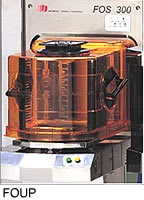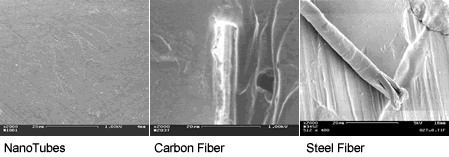|
Electronics
Applications
FIBRIL
nanotubes are used to make statically dissipative plastic compounds
that are fabricated into devices designed for use in environments where
particulate and chemical cleanliness is critical.
  Burn-in
and test sockets for ICs - this very new application is discussed
in greater detail here Socket
Applications (6KB PDF) Burn-in
and test sockets for ICs - this very new application is discussed
in greater detail here Socket
Applications (6KB PDF)
Silicon
wafer handling during IC (chip) manufacturing - front opening
unified pods (FOUPs), standard mechanical interface (SMIF) pods, wafer
cassettes, reticle holders and smaller devices such as tweezers.
Computer
disk drives - internal disc drive components as well as material
transport and handling trays used in the assembly of disc drives.
FIBRIL
nanotubes offer unique performance advantages for electronics applications.
Smoothness and cleanliness of the as-molded part –
the small size and low loading of nanotubes ensures that the part will
not slough (rub-off) particles that can contaminate a clean room environment.
Plastic compounds containing FIBRIL nanotubes have demonstrated consistently
lower liquid particle counts (LPC) then other technologies. In addition,
the chemical cleanliness of the nanotubes insures negligible generation
of volatile or extractable contaminants. For more details please read
Cleanliness
for Clean-Room Environments (133KB PDF).

Uniform
electrical conductivity throughout the part and balanced
shrink/thermal expansion coefficients –
the small size and curvilinear shape of the nanotubes ensures a complete
and random distribution throughout the part.
Minimal increase in base resin viscosity – the
low nanotube loading means that the final compound will have a melt
flow very similar to the base resin. This is important in filling small,
tight-tolerance parts. It is also important in extrusion of thermoformable
sheet used to make static dissipative trays.
Greater retention of the base resin’s toughness
(without the use of impact modifiers) – the low loading of FIBRIL
nanotubes needed to give ESD conductivity also ensures that the base
resin properties are minimally affected.
Related
Articles
Preservation
of Physical Properties (170KB PDF)
Designing for ESD Protection
using FIBRIL™ Nanotubes (96KB PDF)
|

 Burn-in
and test sockets for ICs - this very new application is discussed
in greater detail here
Burn-in
and test sockets for ICs - this very new application is discussed
in greater detail here 



